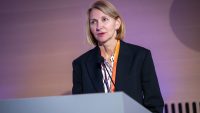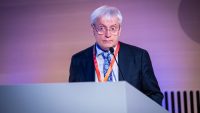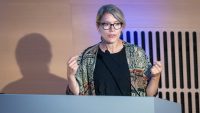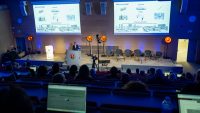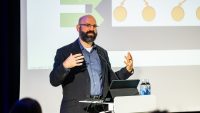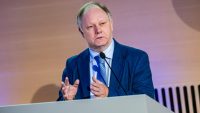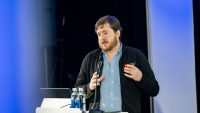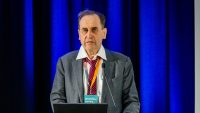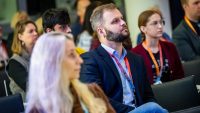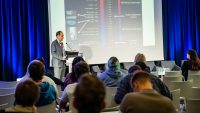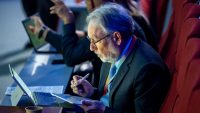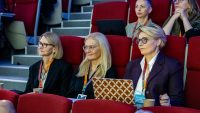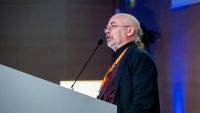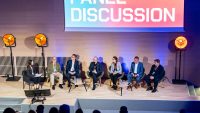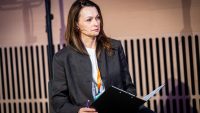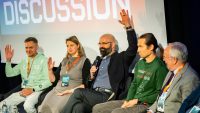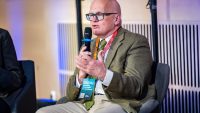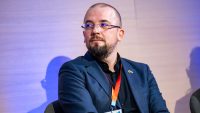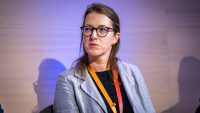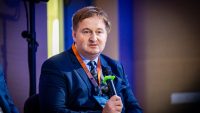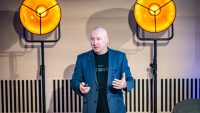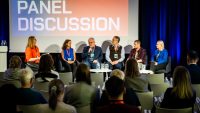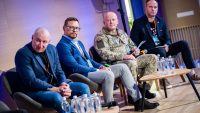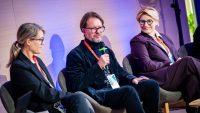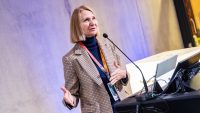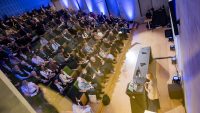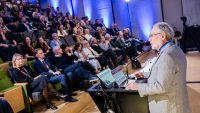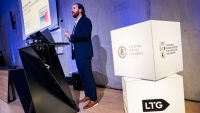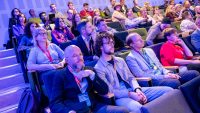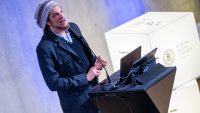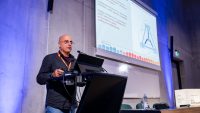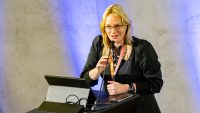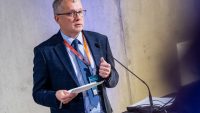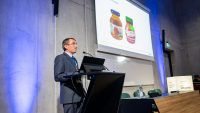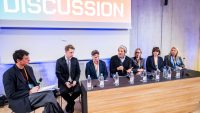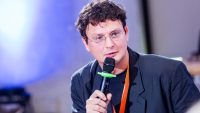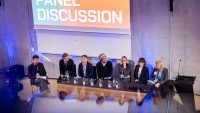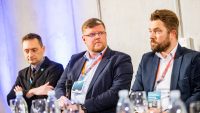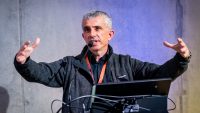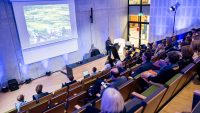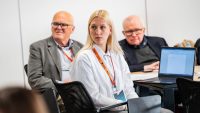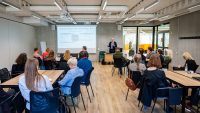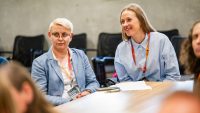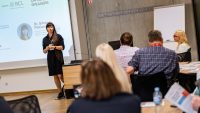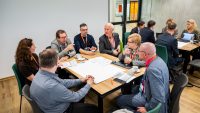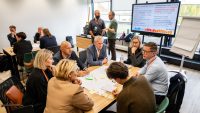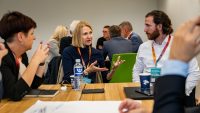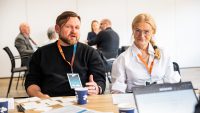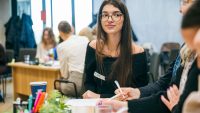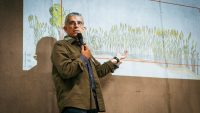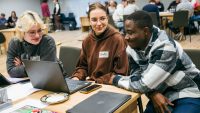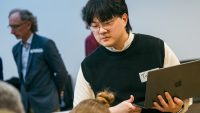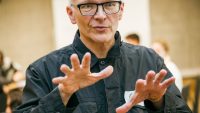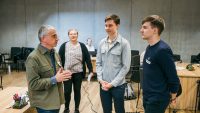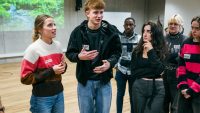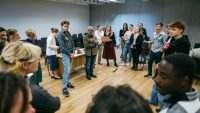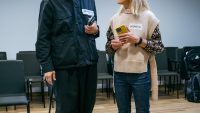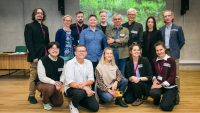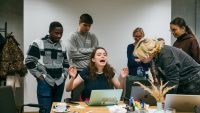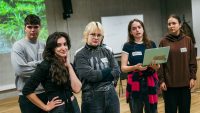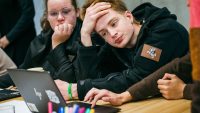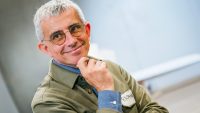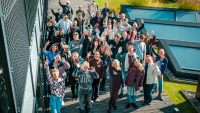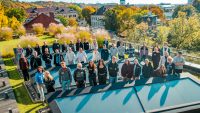Lithuanian and MIT Experts Discussed Responsible Innovation and Pathways To a Sustainable Future
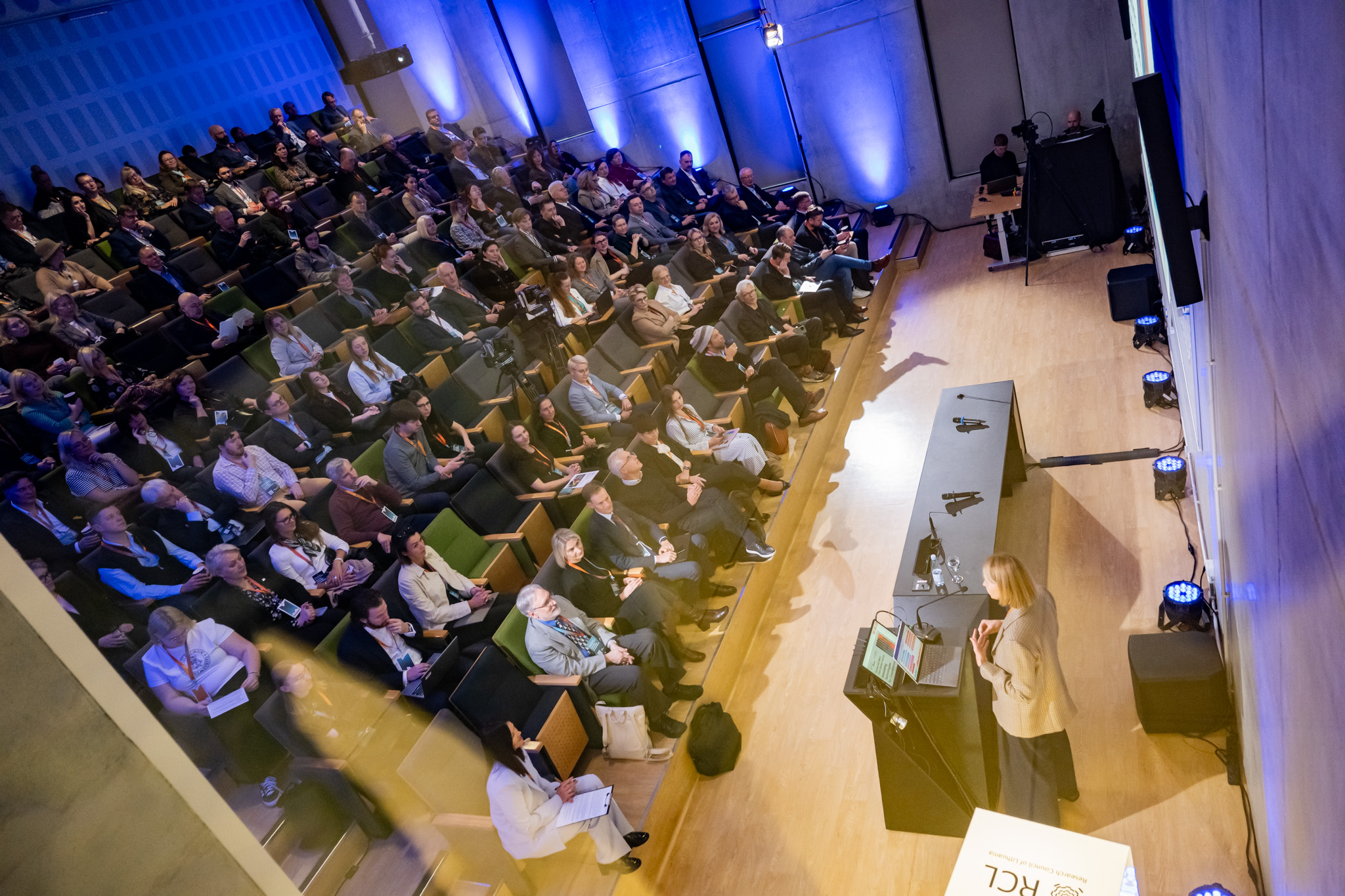
On October 9–10, Lithuania hosted a unique event: scientists from the world-leading innovation hub, the Massachusetts Institute of Technology (MIT), came together with representatives of Lithuania’s science, business, and policy communities for an interdisciplinary conference dedicated to an important mission – jointly seeking responsible innovations and pathways to a sustainable, ethical, and inclusive future while tackling the most pressing challenges in artificial intelligence, climate change, resilient cities, education, defense strengthening, and technological transformation.
The conference, “Human and More-Than-Human Futures: Innovating Technologies for Coexistence,” held in Vilnius and Kaunas, was organized by a consortium of twelve Lithuanian universities, research centers, and companies coordinated by Vytautas Magnus University (VMU). The event followed the consortium’s signing of a cooperation agreement with the MIT Center for International Studies (CIS) and the MIT International Science and Technology Initiatives (MISTI) program.
“It is a great honor to welcome you to this exceptional gathering, this extraordinary event, where MIT’s innovative spirit meets the creative energy and curiosity of Lithuania’s scientific, business, and academic communities. It is in such moments that true cooperation begins – not only through plans and formal agreements, but through shared curiosity and respect,” VMU Rector Prof. Dr. Ineta Dabašinskienė said in her welcome address.
The event aimed to deepen understanding of complex technologies by discussing the prerequisites of justice and well-being that are essential for coexistence. Participants reflected on how to build a future in which people, technology, and nature live in harmony. The focus was on new ideas – how to move beyond merely “smart” technologies to self-learning systems that adapt to humans and take the environment into account. The MIT delegation was led by Prof. Duane Boning, Vice Provost for International Activities, who arrived with roughly a dozen faculty and researchers.
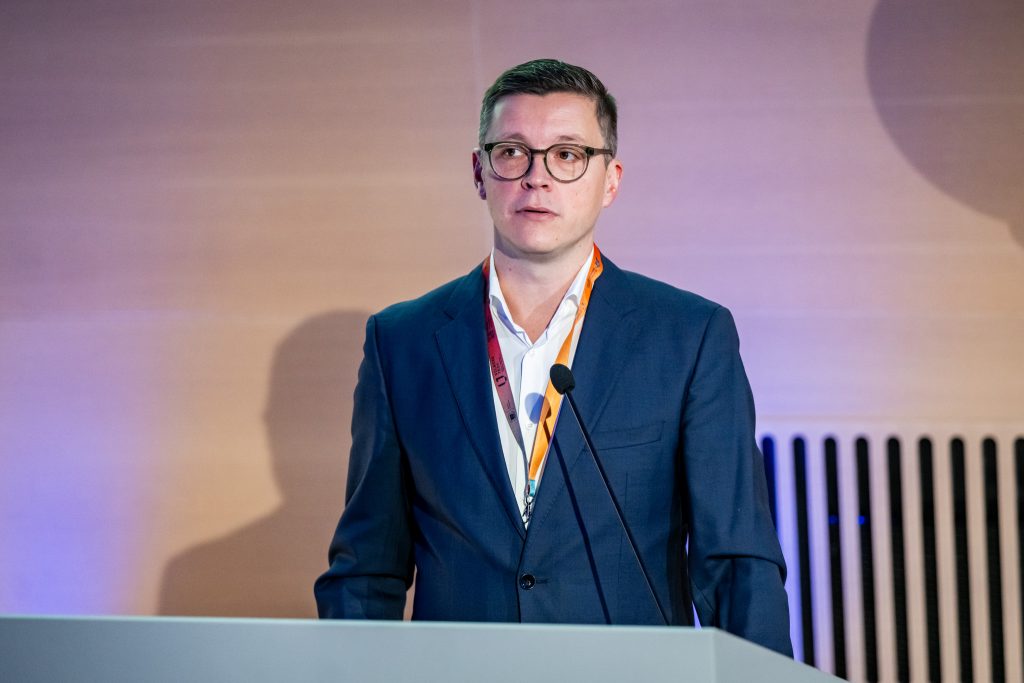
Andres Sevtsuk, the Charles and Ann Spaulding Career Development Assistant Professor of Urban Science and Planning at MIT and Director of the City Form Lab
Cities Should Invite People to Move in Ways Other Than by Car
One of the conference sessions focused on resilience and the creation of livable cities, emphasizing the coexistence of people and nature and the alignment of perspectives from engineering, the humanities, urbanism, and energy. The discussion covered the shift from car-oriented to more pedestrian-friendly cities and highlighted the role of urban design and green technologies in reducing CO₂ emissions and promoting a healthier environment.
“Car-based urbanism is a complete twentieth-century ‘hiccup’ and arguably the biggest change that technology has ever had on city-building. The question now is are cars here to stay with the same level of influence or where are we going forward,” reflected Andres Sevtsuk, the Charles and Ann Spaulding Career Development Assistant Professor of Urban Science and Planning at MIT and Director of the City Form Lab, noting the growing popularity worldwide of pedestrian- and transit-oriented cities.
According to Dr. Sevtsuk, Europe and some Asian countries are demonstrating a new model of city-building – investments in public transport, pedestrian networks, and the integration of land use with mobility so that the city itself “invites” people to move in ways other than by car. Still, despite the many advantages of dense, transit-oriented urban areas, many people choose to live on the urban fringe.
“Often you can’t afford to live in a city center. If you have a family with two or more kids, it’s probably very difficult to find an affordable home in the city center. And people still have aspirations for their own yard or their own car. I think that this is, in part, a post-Soviet legacy too, because people were denied those benefits for such a long time, and they’ve sort of overcompensated in the last two decades or so. The collective challenge ahead is how to institutionally realign the incentives so that the city we build collectively inches towards a different direction,” the MIT scholar summarized.
Discussing the Potential of Hydrogen
In the expert panel at the end of the session, Lithuania’s railway sector was discussed as well: it is electrifying lines, implementing green technologies, and installing ultrasonic “whistles” on older lines to reduce collisions with animals. Other highlights included the use of urban digital twins for data visualization and decision-making, and the importance of awareness and shared responsibility.
Dr. Darius Milčius, Director of the VMU Department of Science and Innovation, emphasized the potential of hydrogen as a sustainable energy source. “Hydrogen is a very interesting, almost perfect material from an environmental point of view when we talk about energy storage and the production of green materials (especially hydrocarbons)”, he said, noting that in prosumer cities, surplus solar energy of the summer can be converted into hydrogen and then used in the winter. But there is a price: to produce one kilogram of hydrogen, about 50 kilowatt-hours of electricity is required and only 33 is received when generating it.
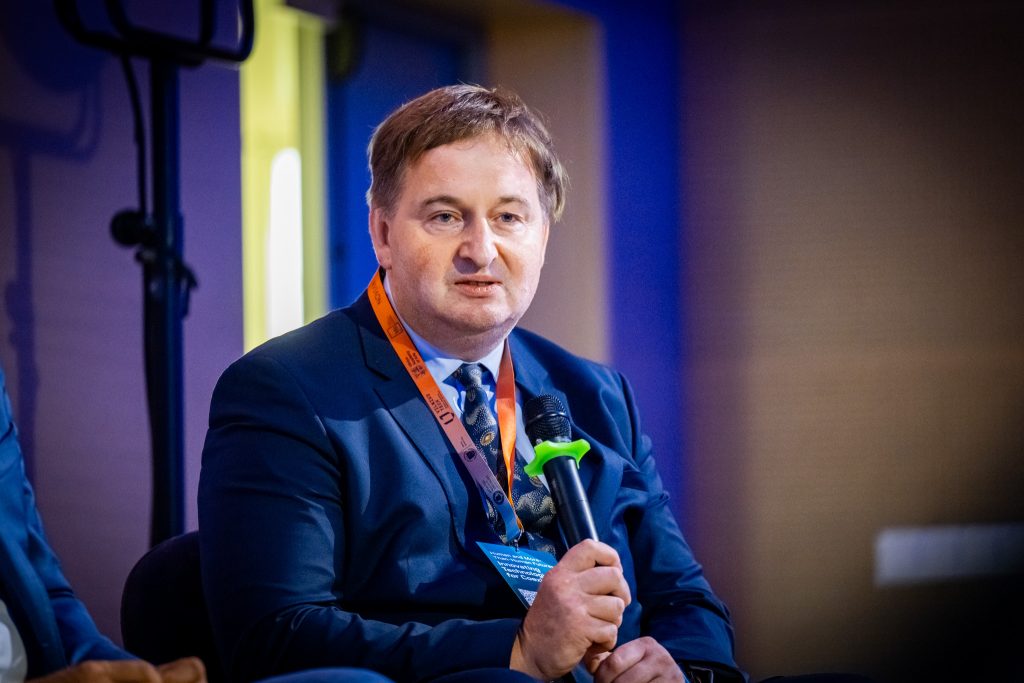
Dr. Darius Milčius, Director of the VMU Department of Science and Innovation
Security and Defense Challenges
Another conference session addressed current issues of defense, security, and resilience. Gene R. Keselman of the MIT Sloan School of Management, Executive Director of MIT’s Proto Ventures program, discussed dual-use policy as a national development strategy.
“Over 30–40 years, Europe and the U.S. have given up the high ground of manufacturing to scale to China. There is no easy solution to the rare earth problem: China controls 99.9 percent of [their] refining and they know how to do the extremely complicated chemistry and extraction processes [to produce] things like high-temperature magnets. It would take us five years minimum just to get the ecological permits, to allow us to do some of the chemical processes that China does, and I assume that’s the case in Europe. There is opportunity here, but you have to start yesterday,” Keselman warned during the speakers’ panel.
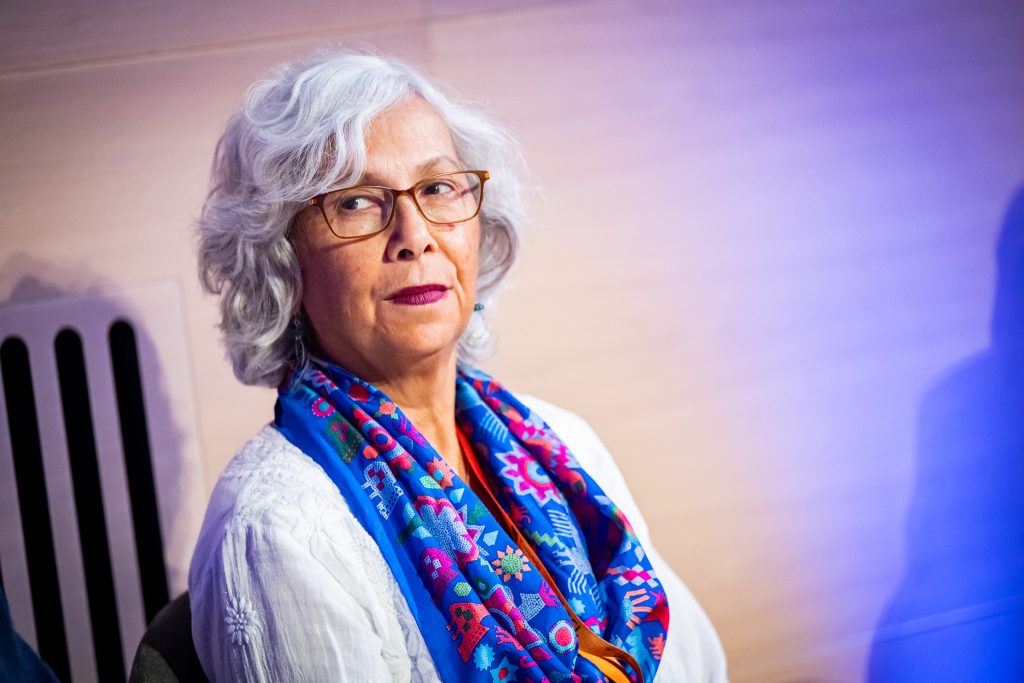
Dr. Una-May O’Reilly, Leader of the ALFA Group at MIT Computer Science and Artificial Intelligence Laboratory (CSAIL)
Dr. Una-May O’Reilly, who leads the ALFA Group at MIT Computer Science and Artificial Intelligence Laboratory (CSAIL), shared thoughts on another topic crucial for defense – artificial intelligence, including adversarial AI and generative models such as ChatGPT, as well as various cybersecurity threats.
“Every layer of your network is attacked simultaneously, then they look at the performance to decide which layer is the most vulnerable, and they reassign their resources to that layer. It’s extremely costly to defend against. Generative models themselves are the attack surface now: someone could use a prompt injection attack to gain access to your model’s parameters, and then they encrypt all parameters until you pay them ransom”, O’Reilly explained.
The defense- and security-focused discussion covered various issues, including the difficulty of manufacturing drones without Chinese components, the success of Lithuania’s FinTech and blockchain sectors, and the need for government support to foster innovation. The role of the Lithuanian Riflemen’s Union in defense innovation and the importance of collaboration with startups and universities were also emphasized. Other conference sessions addressed no less important global challenges – factories of the future, quantum technologies, synthetic biology, and responses to climate change.
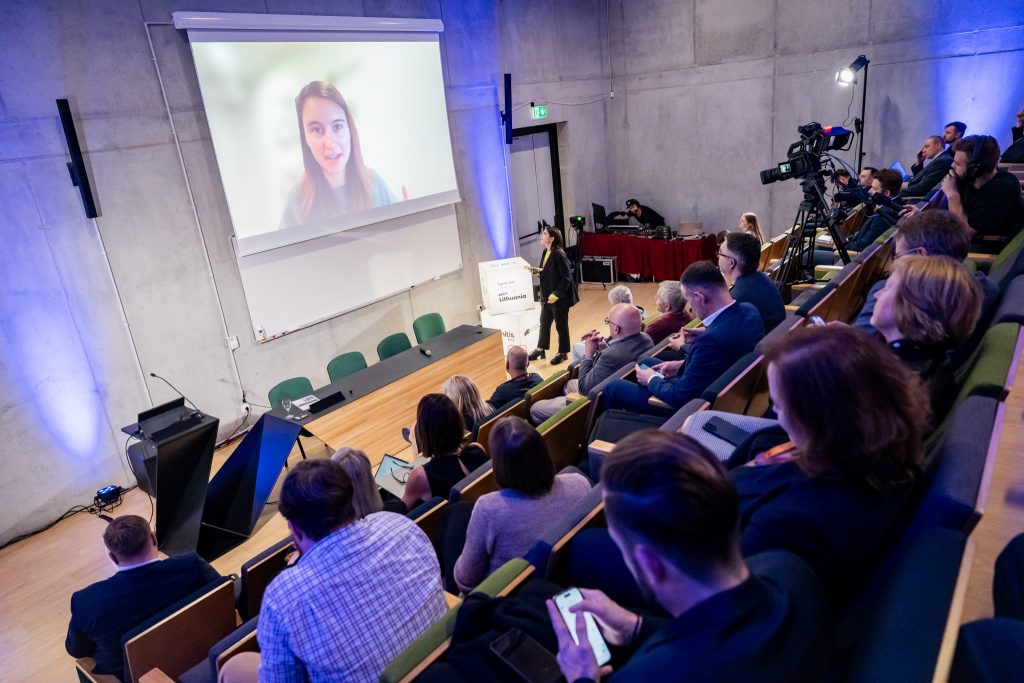
Andreea Bobu, a professor in the MIT Department of Aeronautics and Astronautics and at CSAIL
Artificial Intelligence in the Age of Digitalization
The second day of the conference was devoted to rethinking education and artificial intelligence. One session focused on the multifaceted nature of intelligence in the digitalization era: participants discussed the links between governance, intelligence, and digitalization. The moderator, VMU Associate Professor Dr. Jurga Bučaitė-Vilkė, emphasized that in these turbulent times the interaction between sectors – government, business, and higher education – and institutions’ ability to function under conditions of poly-crises are especially important.
When discussing a culture of data sharing, the speakers viewed openness positively, while also noting European Union regulations that restrict the availability of certain functions in the name of privacy. “The EU regulation is both a blessing and a curse: it [limits access] to some nice AI capabilities”, remarked Dr. Algimantas Černiauskas, representative of the IBM Client Innovation Center Baltic, adding that for ethical reasons IBM has withdrawn from some areas of activity, such as facial recognition.
Andreea Bobu, a professor in the MIT Department of Aeronautics and Astronautics and at CSAIL, presented how large language models (LLMs) are changing robotics and human-robot interaction: rather than training robots solely on vast quantities of demonstrations, we should “borrow” common sense from such language models. However, they cannot be trusted blindly.
“LLMs don’t actually have common sense – they just happen to be statistically correlated with a lot of things that are observed on average in the data they’ve seen on the internet”, said the professor, who heads MIT’s Collaborative Learning and Autonomy Research lab and designs autonomous agents that learn to perform tasks for people or together with them.
Another session focused on radical innovations in learning and how new pedagogical methods are transforming lifelong education. Prof. Fox Harrell from MIT’s Computer Science and Artificial Intelligence Laboratory (CSAIL) participated in the session together with Lithuanian scientists.
The day’s keynote was delivered by Dr. Drew Story, Executive Director of the MIT Policy Lab, which helps MIT researchers engage strategically in the policy-making process so that their work has a greater impact and benefit for society. Participants could join one of four discussion groups to consider strategically important topics and explore opportunities for long-term, broader collaboration between MIT and Lithuania. The discussions aimed to prepare recommendations for policy-makers and to contribute to strengthening Lithuania’s strategic goals.
Photos from Day 1
Photos from Day 2
Agreement with a Global Leader in Science and Innovation
This event followed the signing of an agreement between the MIT Center for International Studies, MIT International Science and Technology Initiatives (MISTI), and twelve Lithuanian science and business partners earlier this year. Planned forms of cooperation currently include MIT student internships in Lithuania, Lithuanian student internships at MIT, and early-stage research grants.
It is expected that these ties could open many opportunities: participation in the MIT MISTI program will strengthen Lithuania’s reputation and visibility as an innovation and technology hub, contribute to creating high-skilled jobs, and modernize the country’s education system by introducing innovative teaching methods.
A Game for Solving Ecological Challenges
Ahead of the conference, Lithuanian students were able to try a unique tool – a game designed to develop sustainability knowledge. Internationally recognized Lithuanian artists and MIT researchers Nomeda and Gediminas Urbonas, in collaboration with French scientists, have created the role-playing game Wetland.games, aimed at fostering ecosystem awareness and promoting sustainability. Taking on various roles, the players explore the wetlands as a system of collective intelligence and look for common solutions while navigating ecological, social, and other interdependencies.
The Minded VMU initiative convened 28 students from multiple disciplines in the Open Minded lab to live‑test the Wetland.games prototype centered on France’s Camargue wetlands and ecosystem stewardship. Guided by Assoc. Prof. Dr. Giedrė Kacienė from VMU Faculty of Natural Sciences, Raimundas Baublys from VMU Agriculture Academy, the session emphasized the power of interdisciplinary collaboration. A meeting was also organized with creators Nomeda and Gediminas Urbonas, French biologist Dr. Raphaël Mathevet, and MIT programmers Terry and Thomas. Future plans include development of a Lithuanian prototype.
Dr. Mathevet, a Director of Research at the French National Centre for Scientific Research (CNRS), gave a talk at the conference on serious games and on incorporating the voices of humans and animals in environmental governance.
“I propose to view environmental governance not only as a technical regulation but as a collective experiment in learning and imagination, where diverse perspectives (scientific, local, institutional, and non-human) can meet and negotiate. One way to open such spaces is to play with perspectives,” said Dr. Mathevet.
Photos from VMU students’ meeting with the creators of Wetland.games
The conference Human and More-Than-Human Futures: Innovating Technologies for Coexistence was organized by the Lithuanian Consortium and supported by the Research Council of Lithuania and Northway Biotech.
Members of the Lithuanian Consortium for collaboration with MIT: coordinator Vytautas Magnus University, Kaunas University of Technology, Klaipėda University, Vilnius University, Vilnius Gediminas Technical University, Vilnius Academy of Arts, Lithuanian Research Centre for Agriculture and Forestry, Lithuanian Energy Institute, AB Ignitis Group, LTG Group, UAB Euromonitor International – Eastern Europe, and UAB Novian.


